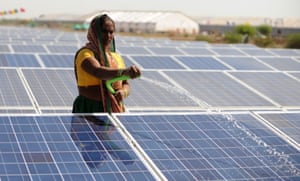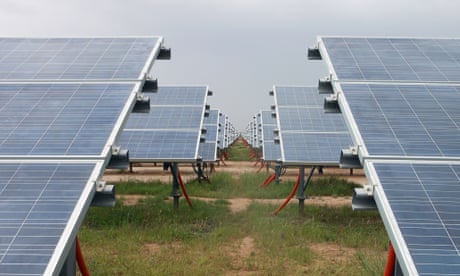India set to unveil global solar alliance of 120 countries at Paris climate summit
India’s prime minister Narendra Modi to announce new alliance of nations and industry on large-scale expansion of solar energy use in the tropics and beyond
 A woman sprays water on panels of India’s first 1MW canal-top solar power plant at Chandrasan village in Mehsana, Gujarat, India. Photograph: Sam Panthaky/AFP/Getty Images
A woman sprays water on panels of India’s first 1MW canal-top solar power plant at Chandrasan village in Mehsana, Gujarat, India. Photograph: Sam Panthaky/AFP/Getty ImagesArthur Neslen
Monday 30 November 2015 16.24 GMTLast modified on Monday 30 November 201516.26 GMT
India’s prime minister Narendra Modi is poised to launch an international solar alliance of around 120 countries with the French president Francoise Hollande at the Paris climate summit on Monday.
France’s climate ambassador Laurence Tubiana said that the new group would be “a true game changer”.
While signatory nations mostly hail from the tropics, several European countries are also on board.
A story of hope: the Guardian launches phase II of its climate change campaign
James Randerson
With crucial climate talks on the horizon, Keep it in the ground turns its focus to hope for the future – the power to change and the solar revolution. Join us and help make that change happen
Read more
“It is very, very exiting to see India nailing its colours to the mast and providing leadership on this issue,” said James Watson, the director of SolarPower Europe, which represents the continent’s solar photovoltaic industry. “It will mean more opportunities for solar across the world and that can only be positive for combating climate change.”
The Indian government is reported to be investing an initial $90m (£60bn) in setting up the alliance headquarters in India, with an eventual goal of raising $400m from membership fees, and international agencies.
Companies involved in the project include Areva, Engie, Enel, HSBC France and Tata Steel.
India wants to use cheap solar to increase energy access, particularly in remote and rural areas.
“The idea is that larger markets and bigger volumes will lead to lower costs making it possible to spur demand,” said Ajay Mathur, India’s senior negotiator and spokesperson at the Paris summit.
“The solar alliance brings together countries that have high solar resource, which have been relatively underexploited, and represents a large market for solar technology,” he said.
In its pledge to the Paris summit, India offered to draw 40% of its electricity from renewables by 2030. The country is projected to be the world’s most populous by this time, with 1.45bn people.
The promise was described as “at the least ambitious end of what would be a fair contribution” by Climate Action Tracker, and not consistent with meeting a 2C target.
But some observers see Modi as a clean energy enabler, after he rapidly rolled out more than 900MW of solar energy across Gujurat, while chief minister there. Modi’s announcement on Monday follows comes hot on the heels of a pledge by the US and 18 other countries to provide $20bn for clean energy research by 2020, a doubling of current funding.
A separate ‘Breakthrough energy coalition’, which will act as an investment platform for clean energy projects is also being launched on Monday by Bill Gates and the Facebook founder, Mark Zuckerberg.

Can Narendra Modi bring the solar power revolution to India?
Read more
On sunday, Dubai announced a Dh100bn ($27bn) programme to make solar panels mandatory for all rooftop buildings by 2030, part of a plan to make the city a global clean energy centre. Dubai aims to generate 25% of its energy from clean sources by 2030, rising to 75% by 2050.
The Indian initiative, called the International Agency for Solar Technologies and Applications (Iasta), aims to spread cheap solar technology across the globe – with pooled policy knowledge.
“We share a collective ambition to undertake innovative and concerted efforts aimed at reducing the costs of financing and urgent technological deployment for competitive solar facilities throughout our country,” a membership statement by the alliance will say.
It adds that the alliance will “pave the way for production technologies and storage of solar-energy, adapted to the specific needs of our country”.
Comments